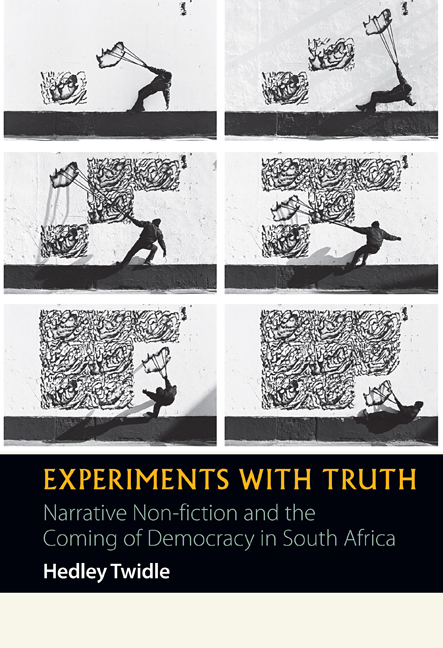Book contents
- Frontmatter
- Contents
- Preface: Encountering non-fiction
- 1 Introduction: Historical and theoretical approaches
- 2 Unusable pasts: The secret history of Demetrios Tsafendas: assassin, madman, messenger
- 3 Literatures of betrayal: Confession, collaboration and collapse in post-TRC narrative
- 4 In search of lost archives: Nostalgia, heterodoxy and the work of memory
- 5 A very strange relationship: Ambition, seduction and scandal in post-apartheid life writing
- 6 Some claim to intimacy: Political biography and the limits of the liberal imagination
- 7 In short, there are problems: Literary journalism in the postcolony
- 8 Unknowable communities: Necessary fictions and broken contracts in the heart of the country
- 9 A new more honest code: Memoirs of the ‘born frees’ and the futures of non-fiction
- 10 Afterword: The extracurriculum
- Bibliography
- Index
- Miscellaneous Endmatter
2 - Unusable pasts: The secret history of Demetrios Tsafendas: assassin, madman, messenger
Published online by Cambridge University Press: 11 September 2020
- Frontmatter
- Contents
- Preface: Encountering non-fiction
- 1 Introduction: Historical and theoretical approaches
- 2 Unusable pasts: The secret history of Demetrios Tsafendas: assassin, madman, messenger
- 3 Literatures of betrayal: Confession, collaboration and collapse in post-TRC narrative
- 4 In search of lost archives: Nostalgia, heterodoxy and the work of memory
- 5 A very strange relationship: Ambition, seduction and scandal in post-apartheid life writing
- 6 Some claim to intimacy: Political biography and the limits of the liberal imagination
- 7 In short, there are problems: Literary journalism in the postcolony
- 8 Unknowable communities: Necessary fictions and broken contracts in the heart of the country
- 9 A new more honest code: Memoirs of the ‘born frees’ and the futures of non-fiction
- 10 Afterword: The extracurriculum
- Bibliography
- Index
- Miscellaneous Endmatter
Summary
In 2012, Human Rights Day in South Africa was officially commemorated not in Sharpeville, where the massacre that it marks took place on 21 March 1960, but in Soweto's Kliptown, site of the signing of the Freedom Charter in 1955. President Jacob Zuma's decision to distance the proceedings – physically and politically – from a march originally organised by the Pan Africanist Congress (PAC) provoked protest both on the streets of present-day Sharpeville and in the pages of the left-liberal press. Yet this state-led attempt to arrogate the meanings of Sharpeville was derailed entirely by the events of 16 August 2012 at the Lonmin platinum mine in Marikana, when over one hundred striking workers were shot by policemen, and thirty-four killed. As the single most lethal use of force by the state against civilians since 1960, the Marikana massacre was soon dubbed the Sharpeville of post-apartheid South Africa.
As the country has moved through other anniversaries and historical landmarks – the centenary of the 1913 Natives Land Act, the death of Nelson Mandela in 2013, the celebration of two decades since the first democratic elections in 1994 – such historical shorthands have become more common in the public sphere. Schoolchildren under Hendrik Verwoerd's ‘Bantu education’ system may have received better instruction than the ‘gutter education’ of learners in some South African provinces today – a claim made by Mamphela Ramphele (‘Education System’, online). Campaigners against the Protection of Information Act (dubbed the ‘Secrecy Bill’) have repeatedly deemed it a step back toward apartheid-era censorship. Student confrontations with riot police during the #FeesMustFall protests of 2015 onwards have been refracted through the iconography of the Soweto Uprising, with placards reading: ‘1976 Reloaded’.
What is at stake in such linkings of past and present? And to what extent should they be indulged or resisted? They seem at once inevitable and unsatisfying. Inevitable given that the conduct of the ruling party has borne out the thesis of an 1881 essay by Ernst Renan (one anthologised by Homi Bhabha in the influential 1990 collection Nation and Narration) which suggests that the modern nation-state constitutes itself through acts of both selective commemoration and deliberate forgetting – ‘I would even go so far as to say historical error’ (11).
- Type
- Chapter
- Information
- Experiments with TruthNarrative Non-fiction and the Coming of Democracy in South Africa, pp. 21 - 46Publisher: Boydell & BrewerPrint publication year: 2019



